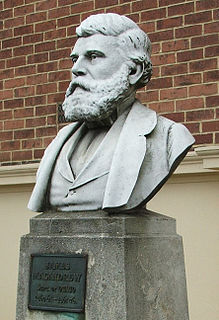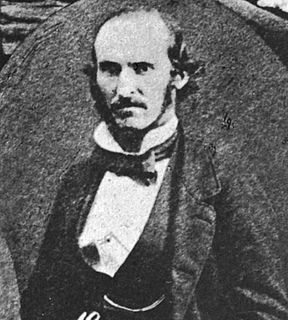Related Research Articles

James Macandrew was a New Zealand ship-owner and politician. He served as a Member of Parliament from 1853 to 1887 and as the last Superintendent of Otago Province.

John Cargill was a New Zealand politician and runholder.

Thomas Bannatyne Gillies was a 19th-century New Zealand lawyer, judge and politician.
Clutha was a New Zealand parliamentary electorate from 1866 to 1996.
Chalmers, originally Port Chalmers, was a parliamentary electorate in the Otago Region of New Zealand, from 1866 to 1938 with a break from 1896 to 1902. It was named after the town of Port Chalmers, the main port of Dunedin and Otago.
Caversham was a parliamentary electorate in the city of Dunedin in the Otago region of New Zealand, from 1866 to 1908.
Taieri is a parliamentary electorate in the Otago region of New Zealand, initially from 1866 to 1911, and was later recreated during the 2019/20 electoral redistribution ahead of the 2020 election.
Dunedin Country was a parliamentary electorate in the rural area surrounding the city of Dunedin in Otago, New Zealand, from 1853 to 1860. It was a two-member electorate and was represented by a total of five members of parliament.

Edward Bowes Cargill was a 19th-century businessman and Member of Parliament in Dunedin, Otago, New Zealand. He was the Mayor of Dunedin from 1897 to 1898.
City of Dunedin, during the first two parliaments called Town of Dunedin, was a parliamentary electorate in Dunedin in Otago, New Zealand. It was one of the original electorates created in 1853 and existed, with two breaks, until 1905. The first break, from 1862 to 1866, was caused by an influx of people through the Otago Gold Rush, when many new electorates were formed in Otago. The second break occurred from 1881 to 1890. It was the only New Zealand electorate that was created as a single-member, two-member and three member electorate.
Dunedin and Suburbs South was a parliamentary electorate in the city of Dunedin in Otago, New Zealand from 1862 to 1866. From 1863 it was a multi-member electorate.
James Paterson was a 19th-century Member of Parliament in Otago, New Zealand. He was a cabinet minister, and on the Legislative Council.
The third New Zealand Parliament was a term of the Parliament of New Zealand. Elections for this term were held between 12 December 1860 and 28 March 1861 in 43 electorates to elect 53 MPs. Two electorates were added to this during this term, Gold Fields District and a new Dunedin electorate created by splitting the existing City of Dunedin into Dunedin and Suburbs North and Dunedin and Suburbs South, increasing the number of MPs to 57. During the term of this Parliament, six Ministries were in power.

The Dunedin Country by-election 1858 was a by-election held in the multi-member Dunedin Country electorate during the 2nd New Zealand Parliament, on 16 June 1858. The by-election was caused by the resignation of incumbent MP John Cargill and was won by John Taylor.
The Dunedin Country by-election 1860 was a by-election held in the multi-member Dunedin Country electorate during the 2nd New Zealand Parliament. The by-election was caused by the resignation of incumbent MP William Cargill. The nomination meeting was held on 28 March and as Thomas Gillies was the only person proposed, he was declared elected unopposed.

The Bruce by-election 1862 was a by-election held in the multi-member Bruce electorate during the 3rd New Zealand Parliament, on 31 July 1862. The by-election was caused by the death of incumbent MP Charles Kettle on 5 June, and was won by Edward Cargill.
The 1859 Town of Dunedin by-election was a New Zealand by-election held in the single-member electorate of Town of Dunedin during the 2nd New Zealand Parliament on 14 January 1859, after the resignation of James Macandrew. The election was won by Macandrew, who had resigned from his seat on 2 November 1858 as a result of not attending a parliamentary session earlier in his term.
William John Dyer was a New Zealand businessman and politician. Born in London, his family moved to Sydney when he was a child. He ran a trading business between Sydney, New Zealand and the Pacific Islands, and moved to New Zealand in 1857. He lived at different times in Dunedin and Milton and entered politics, contesting a number of elections and representing the Tokomairaro electorate in the provincial council.
The April 1865 Bruce by-election was a New Zealand by-election held in the multi-member electorate of Bruce during the 3rd New Zealand Parliament on 8 April 1865. It was triggered on 9 January that year by the resignation of separationist Thomas Gillies and won by prominent settler Arthur John Burns. The more liberal businessman William John Dyer was the sole other contester of the by-election, finishing with 43.33% of the vote.
The July 1865 Bruce by-election was a New Zealand by-election held in the electorate of Bruce during the 3rd New Zealand Parliament on 27 July 1865 triggered by the resignation of Edward Cargill. Three candidates were nominated but one of them withdrew during the nomination meeting. James Macandrew was the successful candidate; he defeated John Cargill, a former Member of Parliament and a brother of the incumbent.
References
- McRobie, Alan (1989). Electoral Atlas of New Zealand. Wellington: GP Books. ISBN 0-477-01384-8.
- Scholefield, Guy (1950) [First published in 1913]. New Zealand Parliamentary Record, 1840–1949 (3rd ed.). Wellington: Govt. Printer.
- Wilson, James Oakley (1985) [First published in 1913]. New Zealand Parliamentary Record, 1840–1984 (4th ed.). Wellington: V.R. Ward, Govt. Printer. OCLC 154283103.